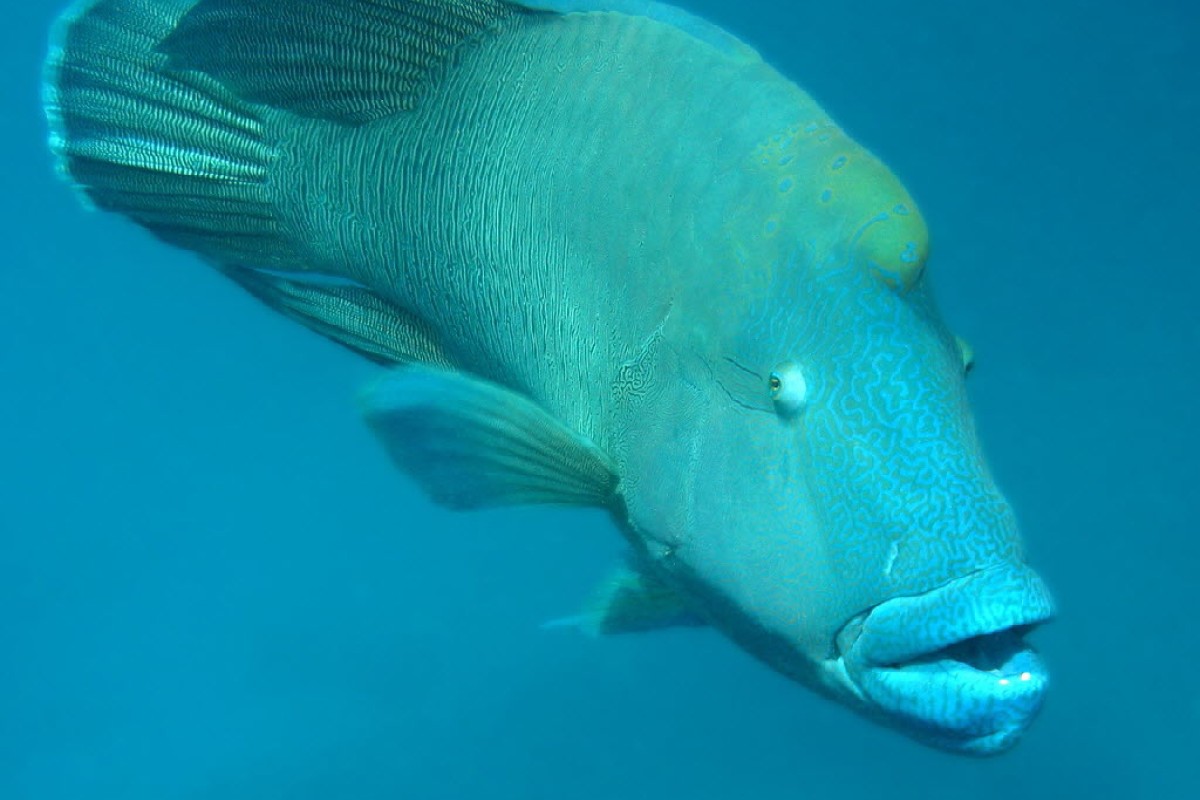
Are you eating threatened species of fish? Here are the 17 to avoid in Hong Kong
- A recent study revealed that some local wet markets are selling endangered fish, with many people unaware due to a lack of proper labelling
- Take a look at our guide to what seafood is safe to eat, and what you should avoid
 The Napolean Wrasse is the only species on the list protected by Cites.
The Napolean Wrasse is the only species on the list protected by Cites. It’s early morning, and the atmosphere outside Tai Po Market is chaotic. Echoes of heated arguments and frenzied negotiations fill the building, as hundreds gather to buy their groceries for the week. But this robust trade is grim news for the Napoleon Wrasse, an endangered species of fish that is still being sold in at least two of Hong Kong’s biggest wet markets.
The Napoleon Wrasse is one of 17 threatened species that have been found at local fish stalls across the city, according to a recent study by Choose Right Today, a sustainable seafood education platform.
The study was conducted from January to June last year at Tai Po and Yeung Uk Road markets.
Banning straws is only the start to ending the problem of plastic in the oceans
Seafood is a staple food of almost every household in Hong Kong. Each individual consumes an average 65.5kg of seafood a year, making the city the second largest consumer of seafood in Asia, according to the World Wide Fund for Nature (WWF).
We, as consumers, rely on labels to know what we are buying, but such labels are not always available. In places like wet markets, especially, it’s easy to buy an endangered or threatened species without knowing about it.
Among the 17 threatened species, two are endangered, and the Napoleon Wrasse is the only one protected by Cites.
It is Hong Kong’s rich marine biodiversity and lack of enforcement that act as a catalyst for the trade.
“At the moment, there is no regulation in Hong Kong. Fishermen are allowed to catch and sell whatever they please,” says Stan Shea, author of the wet market study. “Cites [Convention of International Trade of Endangered Animals and Plants] protects against marine commercial species, like sharks, but the agreement does not account for those being sold in the markets.”
“The results [of the study] make it clear that there is a need for conservation action,” says Choose Right Today’s Communications Manager, Bertha Lo.
While action is being taken at a grass roots level, and NGOs are working to promote more sustainable fishing methods, there’s still a long way to go.
We tried to live plastic-free for a week in Hong Kong and this is what happened
Hong Kong accounts for 50 per cent of the global shark fin trade. A third of the shark fins sold in shops come from threatened or endangered species, according to another study by Cites.
“Locally, the government can explore strategies to effectively manage the trade of endangered species,” says Shea. “The accurate labelling of fish species at retail markets must be implemented, in addition to improving the monitoring capacity.”
Fish farming is not a solution, because it is not done properly, and local waters become polluted as a result. In addition, many farmed fish are fed other fish that have been caught in the rivers or sea. Choose Right Today is creating an app that will enable consumers to ethically and sustainably source seafood items across Hong Kong, and their website has a detailed list of restaurants and supermarkets that are committed to responsible, eco-friendly practices.
The WWF is also spreading the word by working closely with suppliers and restaurants in Hong Kong to source alternative, and more sustainable, seafood.
Hong Kong's pink dolphins are close to extinction ... what can you do about it?
Their Seafood Guide is divided into three categories: Avoid, Think Twice and Recommended.
But despite these efforts, some scientists predict that all commercially fished species could be wiped out in the future, unless our methods change.
“My understanding is that there is [nothing] that can help to solve the problem,” says Shea. “It is more important to see everyone do their part and be proactive – that includes consumers, traders and the government – by increasing the traceability, getting to know exactly what species we are dealing with, and closely monitoring the trade.”
